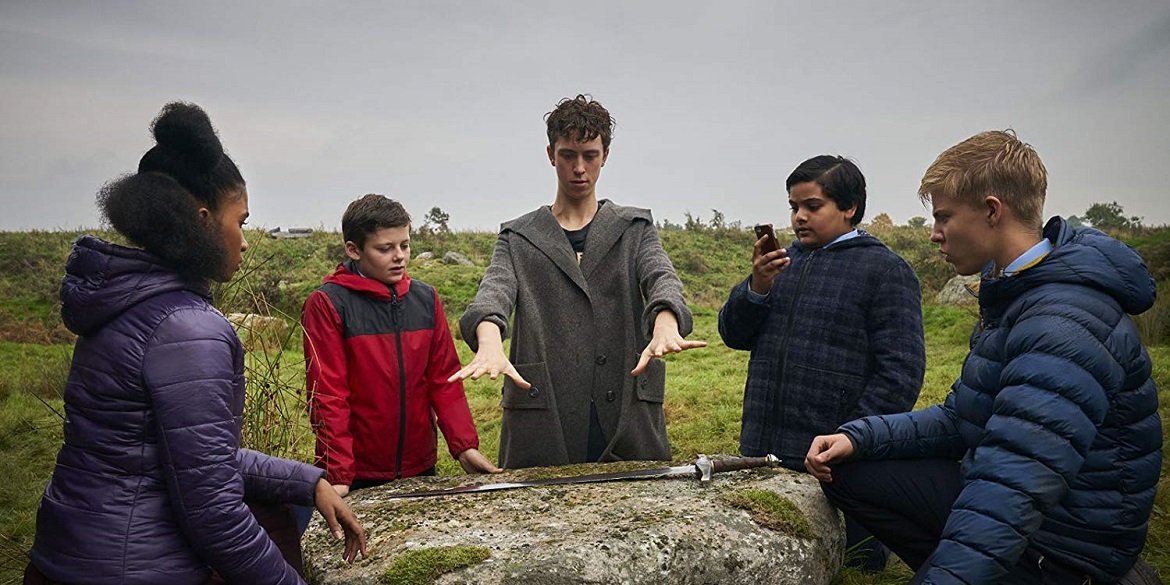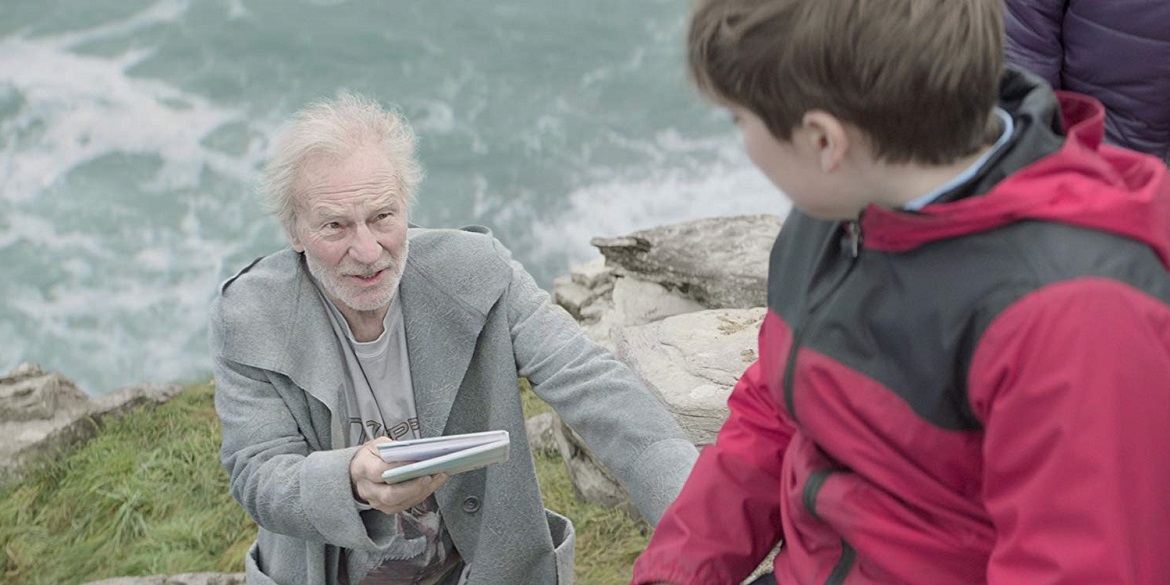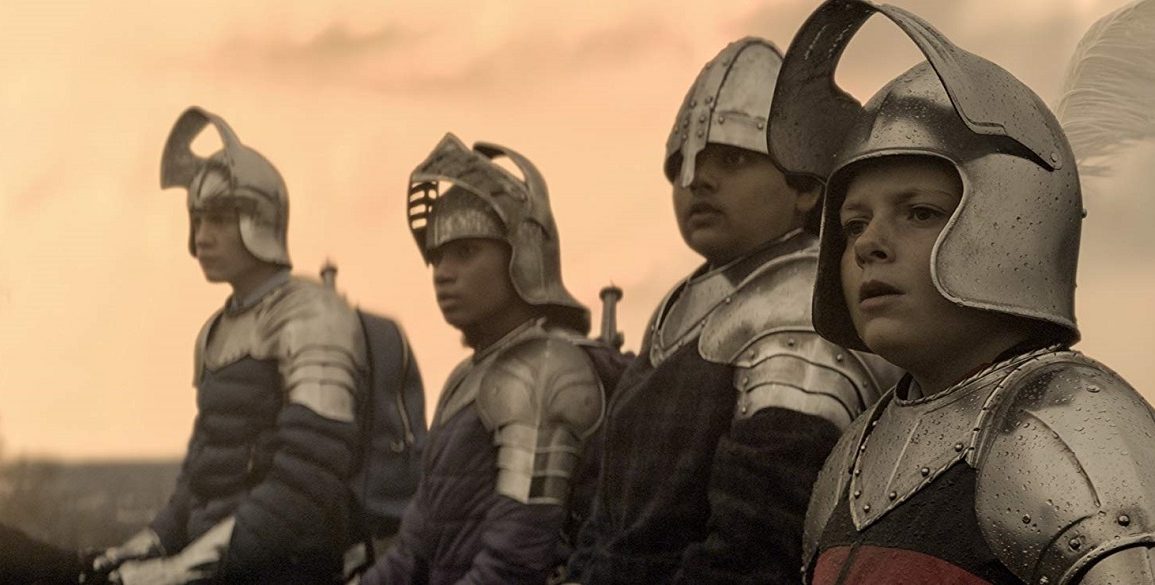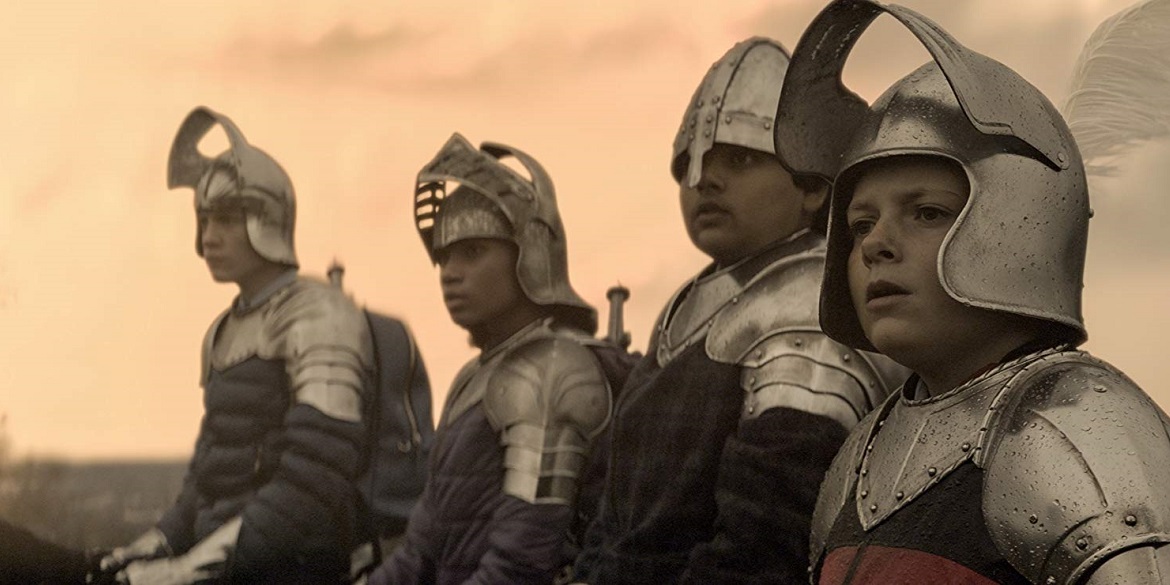There are time that a film comes along, seemingly announcing the arrival of a major new talent. So strong is the picture, that you’re convinced the next several years will be awash with loads of projects barring their name. That was the case with Joe Cornish and his 2011 feature, Attack The Block. A wickedly funny mix of John Carpenter and Stephen Spielberg, it seemed like the start of something grand. While his cast (John Boyega, Jodie Whittaker) would go on to bigger things, his major blip was a co-writing credit on The Adventures of TinTin. His new movie, the family friendly The Kid Who Would Be King, is sure to change that though. With an eye as keen and precise as ever, he makes a strong argument that a seven year hiatus until his next film, would be nothing short of a travesty.
In modern day England, Alex (Louis Ashbourne Serkis, son of Andy) is just a kid trying to scrape by. He lives his a schedule so precise, he’s acutely aware of exactly what time the bullies plan to strike daily. It’s not he they’re after though, but his adorably frail best friend, Bedders (Dean Chaumoo). When retaliating against older and larger Kay (Rhianna Dorris) and Lance (Tom Taylor) one day, Alex is chased to an empty construction site. Alone, scared and confused he comes across an odd sword. After removing it from a stony concrete column, the earth shakes and his life is forever changed.
The next morning a curiously gangly new student, “Mertin” (Merlin’s “clever” alter ego), appears at school, staring intently at young Alex. It turns out removing Excalibur has awoken King Arthur’s half-sister Morgana (Rebecca Ferguson). Due to her defeat at Arthur’s hands years ago, she’s hellbent on making humanity her slaves. Turns out, not only are legends real, but going against the rules of old (mainly the “chivalric code”) may just get you killed. What follows is a to save the world, peppered with welcomed twists and turns, to keep it from feeling stale. Even when, for all intents and purposes, it appears to be heading that way.

By setting The Kid Who Would Be King in a post-Brexit England there’s a cloud of doom and gloom hanging over proceedings. The obvious allegory of dark times leaving the world susceptible to evil is there, but Cornish instead wants to focus on the light not yet snuffed out. The dim hope that the future isn’t only possibly brighter, but entirely worth saving. It would be cloying if he clung entirely to sentimentality, yet he knows the mix of a successful adventure film is lacing hope in with the thrills. And what thrills he has on display. From fiery skeletal knights to killer trees invading a training session to a climactic battle with an undead army, its epic on a small scale.
Tying everything together is a game cast, made up, for the most part, of relatively unknown actors. Serkis portrays Alex as a kid disappointed in the world, though holding onto an inner-strength that inspires those around him. His fellow knights are just as entertaining in their roles. Patrick Stewart, as an older Merlin, pops up sparringly, wearing a Led Zepplin shirt and a twinkle in his eye. Stealing every scene though, is Angus Imrie as the teenage Merlin. Imrie has a gift for spouting utterly ridiculous dialogue as if it’s nothing. Any time he’s on the screen, things crackle just a tad extra, carrying a boyish grin with a stare older than he appears. Don’t be surprised if audience’s walk away endlessly talking about his performance.

Sure, the film runs a little too long, it’s main villain is woefully underrepresented and exposition falls out of people’s mouths like a slot machine paying out a jackpot. Here’s the thing though: it works despite this. Able to mash its hands together in quick succession and produce something akin to magic. In the process it dispenses a lot of frivolities other major blockbusters meander in. Taking every cliche imaginable and imbuing them with sweetness, charm and ease. Making them strengths of the film, as opposed to lazy writing, by someone desperately looking to cash a paycheck. That’s what makes everything here so special. There’s an unabashed desire behind the camera to delight audiences of all ages. It’s a heavy task, but much like Alex, Cornish is worthy to hold the sword up high.
Of course, for all the goodwill it does score, the film isn’t entirely without its faults. Most of them are forgivable or can be overlooked due to the speed of which events unfold. The same can’t be said about Rebecca Ferguson’s Morgana. In her short screentime she cuts an imposing and sniveling character, replete with a ridiculous but fun costume design. Yet that’s it. Outside a basis of what evil she wants to wreck on the world, there isn’t much there. Not to mention, the film then turns her into a CGI being for most of the 2nd half. The kind of glaring oversight, belonging to lesser slapdash productions (looking at you Seventh Son). It’s not the worst thing in the world, just a disappointing one. Specially given the physicality she brings to what ends up almost as a throwaway part.

The most disheartening aspect of The Kid Who Would Be King
doesn’t come from what’s on screen, but rather the audience watching it. Adults often feel brow beaten, when approaching a film geared towards kids. Wearing that chip on their shoulder just may damage the enjoyment nestled inside this minor gem. From an outsider’s perspective, the first inclination that Cornish is “painting by numbers” is sure to turn them off. Yet by doing so, they’ll not only miss his nuance at work, but part of the message contained within.
Just as much as it’s mired in the past, this is a story about forging your own destiny. Of how past stories are often dictated by those in power, littered with lies, sometimes misleading those who read them. It’s message is that where one comes from, shouldn’t dictate who they can or cannot become, unless they let it. Alex isn’t descended from royal ancestry and destined to hold Excalibur because of it. Rather it’s his actions of being good, decent and standing up selflessly for others, that make him worthy. That might be a tad heady for the crowd one assumes this is made for, but taking the risk, pays off tenfold, separating itself from the pack.
This may been seen by some as a bold proclamation, but The Kid Who Would Be King deserves to stand alongside such recent brilliant “kiddie films” as Paddington 2. While it suffers from more missteps than that film, the spirit in which it is made, is eerily similar. Part of the problem is adults are so quick to meet most family fare armed with a dose of preassumed cynicism. These two films suggest an easier approach is encouraged when taking it all in. Namely that, every so often, it’s ok to smile and let oneself be utterly entertained, when in the presence of magic.



